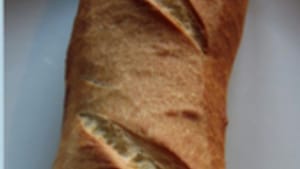Stay in the Loop
BSR publishes on a weekly schedule, with an email newsletter every Wednesday and Thursday morning. There’s no paywall, and subscribing is always free.
Waiting for good dough: Can we talk about Philadelphia bread?
In search of great bread

If you've never been so hungry that you remember some humble dish as the best thing you ever tasted, you've been living too privileged a life.
Our dziadzi (grandfather) was a baker at Freihofer's at 22nd and Arch. But each Sunday we headed out for Jewish rye at Liss's Bakery on Fourth Street (where The Latest Dish restaurant now operates). Grandpa held the huge seeded rounds against his navy blue cardigan, cutting the loaf through to his chest. Then, with the cut side against his chest, he sawed off slices to hand around for us to slather with sÅ‚onina— the pork fat from renderings— and coarse salt.
We ate sÅ‚onina even when there was butter. Poles often called it smalec— think schmaltz, only instead of chicken fat you soft-cook onions in bacon drippings and then chill until it's spreadable. Poland's wildly successful new chain of rustic restaurants, ChÅ‚opskie JadÅ‚o, supplies each table with a tumbler of the stuff. Arguments rage about what to call it. Whatever— one of the best things to spread it on is a dense dark or light Litvak bread from Greenpoint, N.Y. Port Richmond's Polka Deli gets it in on Friday mornings, often selling out by 2 p.m.
When I owned cheese and fancy food shops in Chestnut Hill and Queen Village, bread was one of my most important products. The French company, Vie de France, introduced the first, most authentic French bread to Philadelphia, using French-milled flour, water, yeast and salt, and each day I sold dozens of batons, baguettes and epis.
Now Vie de France is gone from the local scene, leaving Philadelphians no French bread quite so good. Whole Foods' version of a baton is primitive— a poor bread on any level. First, it's too dense and tight inside, and doesn't melt in your mouth in flavor or texture. Instead of a nice, crackly sheen, its skin is smooth and dull, without any interesting caramelized nubs and crooks that invite you to buy two loaves"“ one for home, and one for the walk home.
Metropolitan drops the ball
Metropolitan Bakery's batons have good crackle and color and are tasty, but they're rolled too thin and baked too long to give you the fluffiness to match the inside of a Parisian-style loaf. If anyone can give us an authentic French loaf it ought to be the folks at Metropolitan, and I wonder why they don't. I do recall that Vie de France told me their secret lay in the French-milled flour they imported. The now defunct Pigalle used to bring in an excellent par-baked frozen loaf. The loaves at Parc and Fork, Etc. come really close.
A baker named Cookie Davis came into my Chestnut Hill shop one day with some fekete kenyer, a Hungarian commissary bread— a moist, dense and heavy black boule. I bought all she had stocked in the trunk of her car and, after giving out samples, sold out by the next day. Metropolitan makes a good version of a Russian black bread with raisins, and Kaplan's at Third and Poplar occasionally gets a few loaves on their shelves from a mystery supplier (if you know who, please tell me).
A different kind of terrorist
Not long after the World Trade Center opened in July 1974, I dined at Windows on the World with a group of ten Europeans attending the New York Fancy Food and Confectionary Show. Two weeks later Philippe Petit walked the wire where we would have had a front-row seat if we'd been there for breakfast. While we caroused with escargots, foie gras, caviar, champagne, toasts and jokes, we noticed helicopters flying around and getting in too damn close.
Our table's captain, a gorgeous Argentinean woman in a white, epauletted suit looped with gold braid, told us there was a hostage situation in the other tower. A man with a bomb. We finished and left, somberly.
The next morning the New York papers reported the incident. A Polish man had taken a judge and three others hostage with what he said was a bomb in his rucksack. The police persuaded him to surrender, and the "bomb" turned out to be just four loaves of black bread. Every time I eat black bread I wonder whatever became of the Polish bomber. We know only too well those other bombers didn't bring anything so benign, so humble, so sublime as a good loaf of bread.
To read a response, click here.
Our dziadzi (grandfather) was a baker at Freihofer's at 22nd and Arch. But each Sunday we headed out for Jewish rye at Liss's Bakery on Fourth Street (where The Latest Dish restaurant now operates). Grandpa held the huge seeded rounds against his navy blue cardigan, cutting the loaf through to his chest. Then, with the cut side against his chest, he sawed off slices to hand around for us to slather with sÅ‚onina— the pork fat from renderings— and coarse salt.
We ate sÅ‚onina even when there was butter. Poles often called it smalec— think schmaltz, only instead of chicken fat you soft-cook onions in bacon drippings and then chill until it's spreadable. Poland's wildly successful new chain of rustic restaurants, ChÅ‚opskie JadÅ‚o, supplies each table with a tumbler of the stuff. Arguments rage about what to call it. Whatever— one of the best things to spread it on is a dense dark or light Litvak bread from Greenpoint, N.Y. Port Richmond's Polka Deli gets it in on Friday mornings, often selling out by 2 p.m.
When I owned cheese and fancy food shops in Chestnut Hill and Queen Village, bread was one of my most important products. The French company, Vie de France, introduced the first, most authentic French bread to Philadelphia, using French-milled flour, water, yeast and salt, and each day I sold dozens of batons, baguettes and epis.
Now Vie de France is gone from the local scene, leaving Philadelphians no French bread quite so good. Whole Foods' version of a baton is primitive— a poor bread on any level. First, it's too dense and tight inside, and doesn't melt in your mouth in flavor or texture. Instead of a nice, crackly sheen, its skin is smooth and dull, without any interesting caramelized nubs and crooks that invite you to buy two loaves"“ one for home, and one for the walk home.
Metropolitan drops the ball
Metropolitan Bakery's batons have good crackle and color and are tasty, but they're rolled too thin and baked too long to give you the fluffiness to match the inside of a Parisian-style loaf. If anyone can give us an authentic French loaf it ought to be the folks at Metropolitan, and I wonder why they don't. I do recall that Vie de France told me their secret lay in the French-milled flour they imported. The now defunct Pigalle used to bring in an excellent par-baked frozen loaf. The loaves at Parc and Fork, Etc. come really close.
A baker named Cookie Davis came into my Chestnut Hill shop one day with some fekete kenyer, a Hungarian commissary bread— a moist, dense and heavy black boule. I bought all she had stocked in the trunk of her car and, after giving out samples, sold out by the next day. Metropolitan makes a good version of a Russian black bread with raisins, and Kaplan's at Third and Poplar occasionally gets a few loaves on their shelves from a mystery supplier (if you know who, please tell me).
A different kind of terrorist
Not long after the World Trade Center opened in July 1974, I dined at Windows on the World with a group of ten Europeans attending the New York Fancy Food and Confectionary Show. Two weeks later Philippe Petit walked the wire where we would have had a front-row seat if we'd been there for breakfast. While we caroused with escargots, foie gras, caviar, champagne, toasts and jokes, we noticed helicopters flying around and getting in too damn close.
Our table's captain, a gorgeous Argentinean woman in a white, epauletted suit looped with gold braid, told us there was a hostage situation in the other tower. A man with a bomb. We finished and left, somberly.
The next morning the New York papers reported the incident. A Polish man had taken a judge and three others hostage with what he said was a bomb in his rucksack. The police persuaded him to surrender, and the "bomb" turned out to be just four loaves of black bread. Every time I eat black bread I wonder whatever became of the Polish bomber. We know only too well those other bombers didn't bring anything so benign, so humble, so sublime as a good loaf of bread.
To read a response, click here.
Sign up for our newsletter
All of the week's new articles, all in one place. Sign up for the free weekly BSR newsletters, and don't miss a conversation.

 Merilyn Jackson
Merilyn Jackson